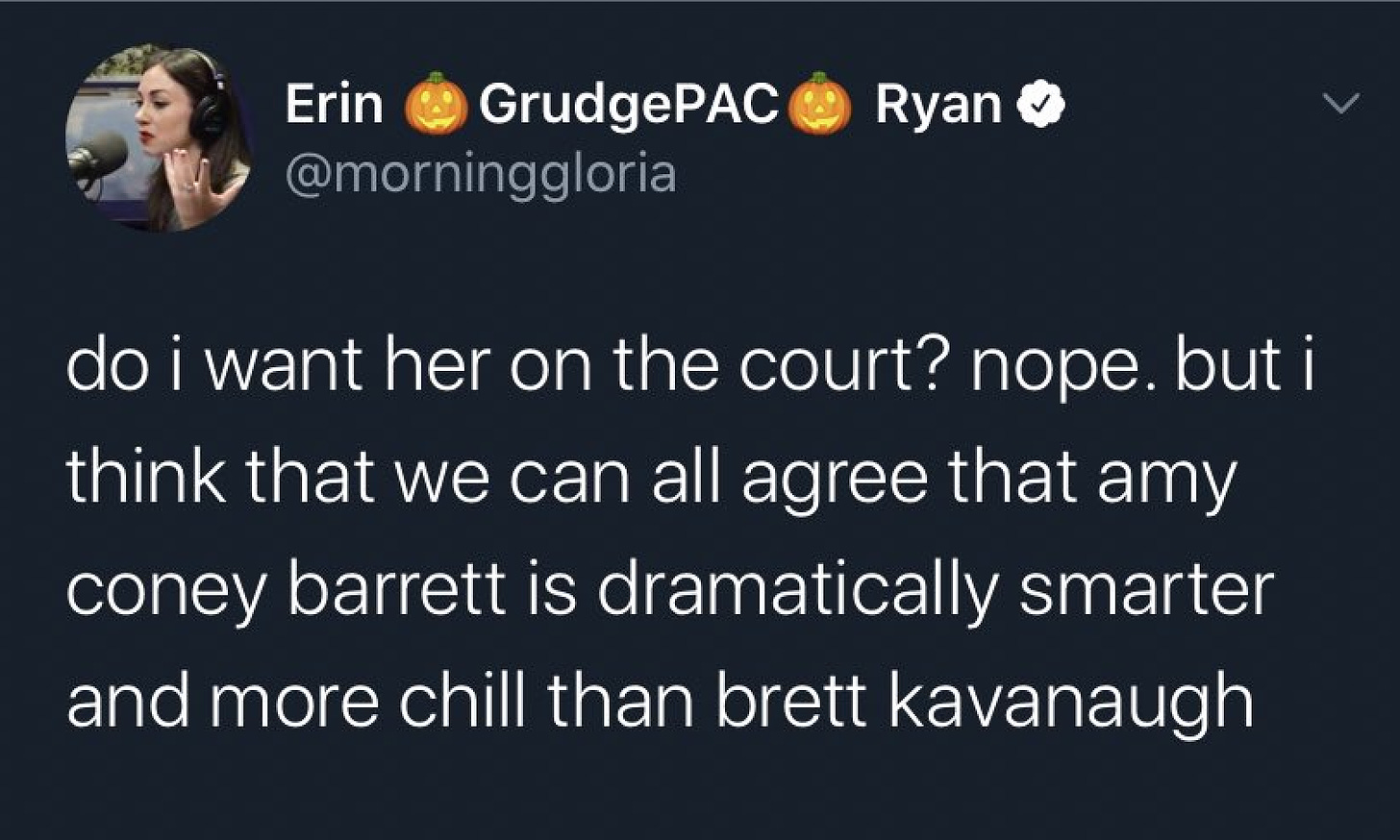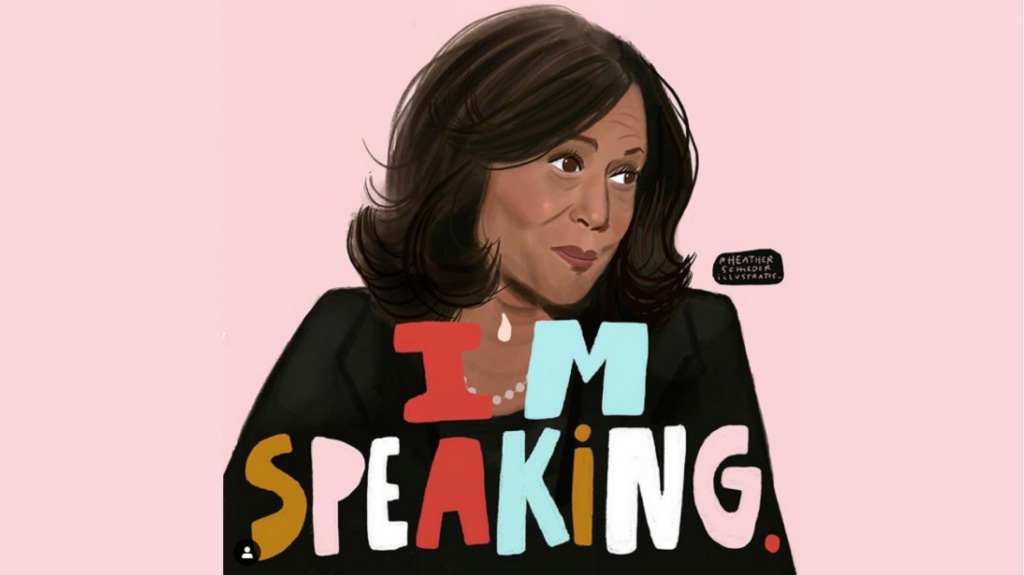Realism Has Become An Identity Unto Itself
If you pretend you have no power you don't have to do anything

As of press time there are only 2 copies of my book, A Good Place for Maniacs: Dispatches From the Pacific Crest Trail left in stock at Third Place Books: Lake Forest Park—but you can buy it online at your favorite independent bookseller, too! Here’s one I like.
There’s an election coming up, you might have heard. Personally I can’t wait for it to be over. Not because I’m one of those people who handwaves away those clowns in Congress and thinks politics have nothing to offer, mind you—I am consumed by politics almost to the point of paralysis most days. No, I am mostly ready to be done with the election because the spectacle of it all is exhausting, and almost all of it is meaningless pandering in which I no longer find even any entertainment value.
After what happened in 2016 I know not to think of anything as a certainty, but with each passing day a Joe Biden win looks more and more likely, provided the process ends up anywhere this side of “CIA-backed coup via sham election in Latin America.” And if that happens I confess myself morbidly curious about what my liberal friends—and the politicians they’ve talked themselves into seeing as not just “good (compared to the even more miserable alternative)” but “good (objectively)”—are going to do. For four years now Donald Trump has served as a world-historic enemy, a foil, an excuse; the Left has been told by liberals for that same amount of time that nothing they want can come to pass because of the Big Bad Man who occupies the Oval Office. That his presence means that we can’t risk actually helping anyone right now, for fear that he will continue not helping anyone.
What will liberals actually do with power? I know that if I had a dollar for every time I’ve seen a former classmate, or a relative, or a friend of my parents, or a parent of my friends, post something to the effect of Fight like hell to get Joe Biden elected and then put his feet to the fire every day he’s in office! in the past month, I would have at least another $27 that I could have donated to Bernie Sanders’ campaign. But how do you hold someone’s feet to the fire when they’ve tied your hands behind your back and hired a (non-union, low-bid) contractor to come take out the fireplace?

The thing is, we actually do know what liberals would do with power. The “If Hillary Had Won We’d Be At Brunch Right Now” crowd makes for a neat example, of course, but we should be punching up, not down—and the forecast from liberal politicians is hardly any more inspiring. In a recent issue of The Atlantic, hardly a mouth-foaming communist rag, Luke Savage writes:
Liberalism in the Trump era has thus become a kind of strange pantomime act in which elite politicians deploy the rhetoric of imminent threats and national emergency only to behave like hapless passengers trapped aboard a sinking ship. Although it has certainly found its most potent expression in Washington, this posture of feigned powerlessness has gradually come to infect the broader culture and ideology of American liberalism as a whole.
I’ve written about one manifestation of this phenomenon before; elected Democrats love nothing more than to pretend that they are simply individuals who are trying to do well and do better, rather than the faces of an incredibly powerful system of forces that controls the lives of regular people. Savage describes a similar offshoot, whereby elected Democrats abdicate all responsibility for even trying to use their office to do better, again pretending to be just one more voice on the Right Side of Things, clamoring for justice.
Even in solidly blue states where Democrats face none of the institutional impediments that confront them in Washington, D.C., robust progressive legislative agendas are rare. Powerful figures such as New York Governor Andrew Cuomo and California Governor Gavin Newsom issue bulletins about climate change that read more like desperate pleas from activists than statements by sitting governors with the power to make and alter laws. (In response to the recent wildfires raging across the West Coast, Newsom announced that he has “no time for climate-change deniers,” despite having approved some 48 new fracking permits since April. Cuomo tweeted, “This is what climate change looks like. The proof is right in front of us. This is a national emergency—it’s now or never.”) The Democratic Party’s 2020 nominee for president, meanwhile, is a former vice president who pledges to reform corporate America through “non-legislative” means and proudly champions the idea that “nothing fundamental” needs to change. On issues as varied as the environment, racial oppression, and immigrant rights, the culture of liberalism has rarely been so suffused with a language of moral urgency and social justice; as an institutional and ideological presence in American life, its politics has rarely been so unambitious or shy of confrontation.
One reason that we let people who are so nakedly running from the duties that we ostensibly elected them for continue to do this is that Democratic voters—like Donald Trump!—are obsessed with intelligence as its own virtue. (Democratic electeds are not so abstract; the reason they are so unwilling to do what the world needs them to do is simpler: they, like the Republicans, ultimately serve the interests of capitalism, and would rather fight against you than fight against it.)
Freddie de Boer, writing in The Washington Post last week, described the consequences of those attitudes, as well as providing a prescription for undoing them:
Most of us don’t have much in common with President Trump. But when he lashed out after Joe Biden suggested he wasn’t smart in last week’s presidential debate, Trump reminded us that both we and he are stuck in what I call the Cult of Smart, a veneration of a narrow kind of intelligence.
Heavy on abstract and analytic reasoning, light on emotional understanding, this type of mental prowess is great for getting someone into Stanford and on to a job at Google. It’s far less useful when viewing the world as something other than a set of facts and statistics — and making the kind of choices a president faces. And it will take more than electing a University of Delaware graduate president to extricate ourselves from this cult and its consequences.
…Dismantling the Cult of Smart will take more than getting rid of one terrible president. It will take a sea change in some of our most basic attitudes about human success. But if we use someone like Trump to hold a mirror up to ourselves and take care to catalogue all of the ways our obsession with schooling is destructive, big and small, we may just build the will necessary for real change.
The proliferation of the Cult of Smart is no accident, by the way. If you can turn politics into an exercise of pure credentialism, you can obfuscate just about every power dynamic that actually governs the lives of people in this country. If you can collapse politics into a competition to put the “most qualified” people into office and let them take it from there, you can situate yourself smugly above the people whose interests you pretend to serve and foreclose on any real possibility for democratic decision-making or a society based on the needs of the many.

I swear it’s basically a reflex for liberal media types at this point. Oh my God who gives a shit?!?!?!?
This credentialism takes many forms, from the cult of personality based around a bloodless man devoid of charisma because he claimed to have read Ulysses and gained fluency in seven languages to the one that has made a #GirlBoss out of a comically, relatably expressive woman…whose career was made by trampling on the rights and freedoms of poor, incarcerated, and transgender people in California. The liberal obsession with competence has hit a frightening fever pitch in the past four years—and has made too many Democrats proud to trumpet their own inadequacy compared to a handful of people who wouldn’t piss on them to put them out if they were on fire.

All of this acquiescence to the smart people in power means that liberals have begun to parrot another one of their lies, which is that they personally want to get good things done, but it’s just not politically feasible to do so. We’ve heard it about Medicare for All, about a Green New Deal, about banning fracking, about police reform and prison reform. All good things that we can’t have because, allegedly, it’s all those other folks who don’t want them. When I am frustrated by that clever bit of malfeasance disguised as political savvy, I often find myself turning to Ralph Miliband, who diagnosed the failures of liberalism better than many. His collaboration with Marcel Liebman, “Beyond Social Democracy,” makes this same point.

Medicare for All was polling above 50% among voters of both parties while Bernie was still in the race. Makes you wonder why the other candidates all spent so much airtime attacking it.
Miliband was writing from the U.K. and had previously lived elsewhere in Europe; would that we in America had even remotely social-democratic leaders to make this criticism of! But the point remains: we are already hopelessly overmatched by the ruling interests of this country, and we’re not going to be able to put up a fight if we can’t even conceptualize that a fight—a rupture—needs to happen.
To return to Savage once more:
It’s all well and good to recognize the structural constraints imposed by America’s political system, and the difficulty of passing major reforms in the face of organized opposition. But for too many of America’s leading liberal politicians, “realism” has become an identity unto itself, unmoored from any programmatic orientation toward the future or sustained effort to bring about significant change.
So…yeah, this sucks, man. Do what you have to do on election day to feel like you’re contributing to the end of this horrifying era. But please don’t fall into the trap of feeling like this changes anything on its own. Which is not to say that there is nothing to be done! It will take a period of sustained struggle, one that may take so long that people reading this newsletter won’t even live to see it end, and I think that one piece of the puzzle has to be that people who were made morally (but not materially) uncomfortable in the past four years have to stop kidding themselves about what is and isn’t worth doing to change things—and who is and isn’t worth supporting to make that happen.
We’ve got work to do. Talk to you next week.
-Chuck
PS- If you like what you read here, why not subscribe and get this newsletter in your inbox each week? It’s free and always will be.



